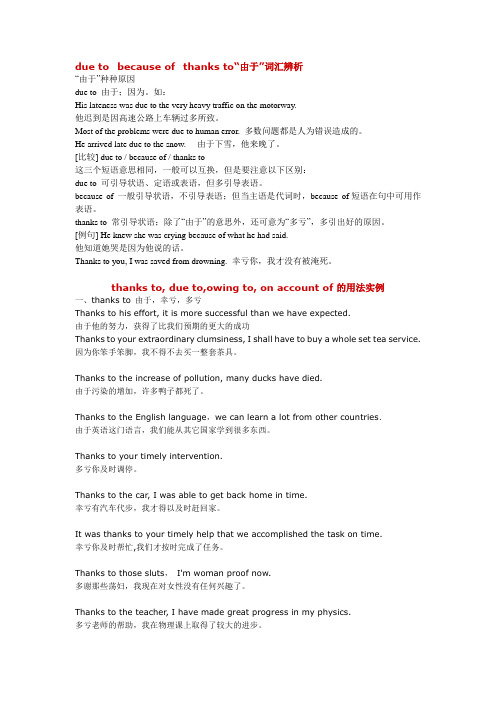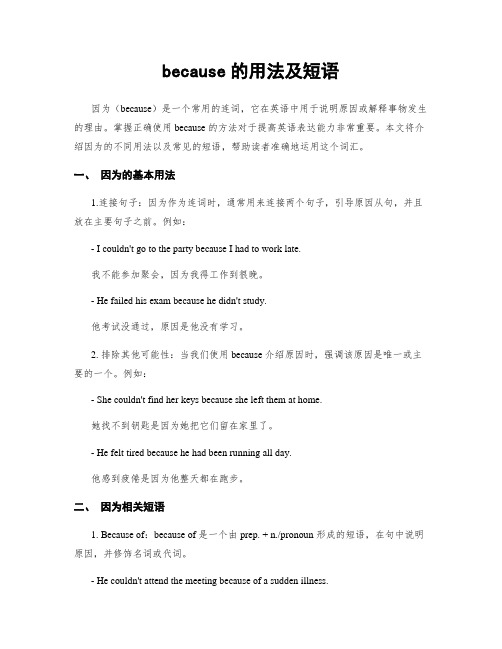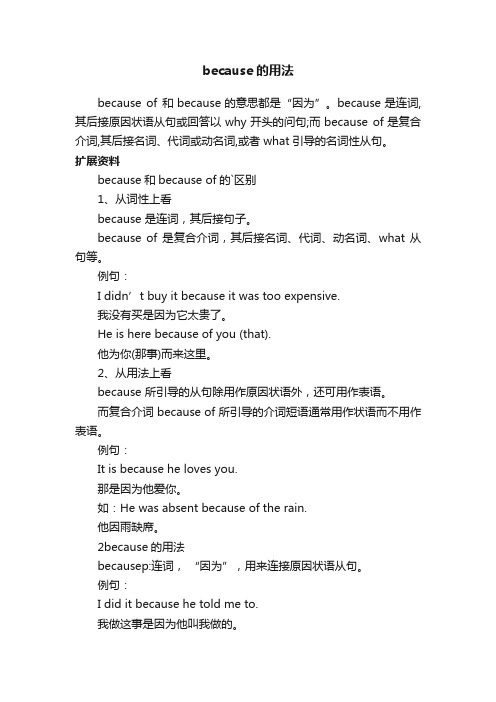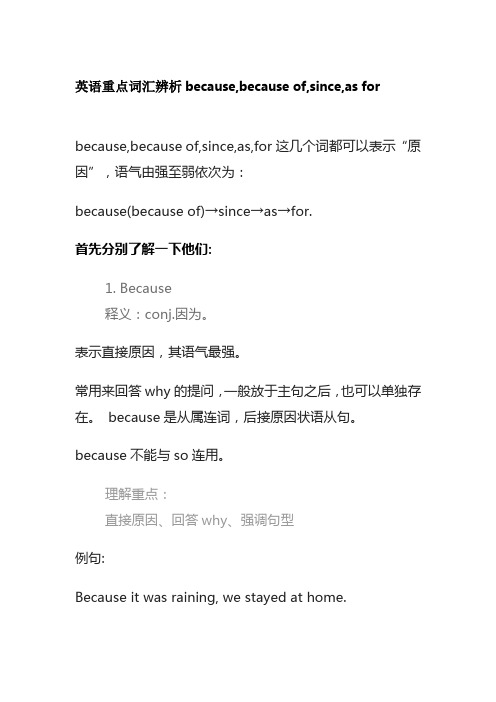because of的用法
due to because of thanks to“由于”词汇辨析

due to because of thanks to“由于”词汇辨析“由于”种种原因due to 由于;因为。
如:His lateness was due to the very heavy traffic on the motorway.他迟到是因高速公路上车辆过多所致。
Most of the problems were due to human error. 多数问题都是人为错误造成的。
He arrived late due to the snow. 由于下雪,他来晚了。
[比较] due to / because of / thanks to这三个短语意思相同,一般可以互换,但是要注意以下区别:due to 可引导状语、定语或表语,但多引导表语。
because of 一般引导状语,不引导表语;但当主语是代词时,because of短语在句中可用作表语。
thanks to 常引导状语;除了“由于”的意思外,还可意为“多亏”,多引出好的原因。
[例句] He knew she was crying because of what he had said.他知道她哭是因为他说的话。
Thanks to you, I was saved from drowning. 幸亏你,我才没有被淹死。
thanks to, due to,owing to, on account of 的用法实例一、thanks to 由于,幸亏,多亏Thanks to his effort, it is more successful than we have expected.由于他的努力,获得了比我们预期的更大的成功Thanks to your extraordinary clumsiness, I shall have to buy a whole set tea service. 因为你笨手笨脚,我不得不去买一整套茶具。
because的用法及短语

because的用法及短语因为(because)是一个常用的连词,它在英语中用于说明原因或解释事物发生的理由。
掌握正确使用 because 的方法对于提高英语表达能力非常重要。
本文将介绍因为的不同用法以及常见的短语,帮助读者准确地运用这个词汇。
一、因为的基本用法1.连接句子:因为作为连词时,通常用来连接两个句子,引导原因从句,并且放在主要句子之前。
例如:- I couldn't go to the party because I had to work late.我不能参加聚会,因为我得工作到很晚。
- He failed his exam because he didn't study.他考试没通过,原因是他没有学习。
2. 排除其他可能性:当我们使用 because 介绍原因时,强调该原因是唯一或主要的一个。
例如:- She couldn't find her keys because she left them at home.她找不到钥匙是因为她把它们留在家里了。
- He felt tired because he had been running all day.他感到疲倦是因为他整天都在跑步。
二、因为相关短语1. Because of:because of 是一个由 prep. + n./pronoun 形成的短语,在句中说明原因,并修饰名词或代词。
- He couldn't attend the meeting because of a sudden illness.因为突发疾病,他无法参加会议。
- She missed the flight because of traffic congestion.因为交通堵塞,她错过了航班。
2. Just because:just because 是一个固定的短语,在句中表示警告或强调,并表明一个事物不应当被认为是真实的原因。
because 和 because of 用法

1) Henry couldn't take part in the sports meeting because his leg got broken.
Henry couldn‘t take part in the sports meeting because of his broken lecause of 是复合介词,其后接名词、代词、动名词 (v-ing)、what 从句等。
e.g: We can't go to the zoo because the weather is too bad. We can't go to the zoo because of the bad weather. We can't go to the zoo because of him. We can't go to the zoo because of raining. We can't go to the zoo because of what he had done.
3) The heavy snow prevented them from going to the concert.
They didn't go to the concert because of the heavy snow.
4) It was the noise that kept me from falling asleep.
He can't get in, because of the dog in front of the door.
He can come in because he has the privilege to do this.
because知识点用法

because知识点用法在英语中,单词"because"是一个连词,用于表示原因或解释。
它将一个原因与一个结果进行连接,使得语句更加连贯和合理。
以下是一些关于"because"连词的常见用法和例句:1. 使用"because"引导原因状语从句:"I couldn't attend the party because I had to work late."(我不能参加派对,因为我得工作到很晚。
)2. 使用"because of"表达原因或解释:"He couldn't come to the meeting because of a family emergency."(他因为家庭紧急情况无法参加会议。
)3. "because"后面通常跟着完整的句子,而不是短语或单词:错误示范:I didn't go out because raining.正确示范:I didn't go out because it was raining.(我没出门,因为下雨了。
)4. "because"可以位于句首或句中,但通常在句子中间使用逗号分隔:"Because it was raining, we decided to stay indoors."(因为下雨了,我们决定呆在室内。
)"We decided to stay indoors because, it was raining."(我们决定呆在室内,因为下雨了。
)请注意,使用"because"时应注意以下几点:- 不要滥用"because",过多的使用会使句子变得累赘。
- 避免使用复杂的句子结构,以免造成理解困难。
because的用法

because的用法because of 和because的意思都是“因为”。
because是连词,其后接原因状语从句或回答以why开头的问句;而because of是复合介词,其后接名词、代词或动名词,或者what引导的名词性从句。
扩展资料because和because of的`区别1、从词性上看because 是连词,其后接句子。
because of 是复合介词,其后接名词、代词、动名词、what 从句等。
例句:I didn’t buy it because it was too expensive.我没有买是因为它太贵了。
He is here because of you (that).他为你(那事)而来这里。
2、从用法上看because 所引导的从句除用作原因状语外,还可用作表语。
而复合介词 because of 所引导的介词短语通常用作状语而不用作表语。
例句:It is because he loves you.那是因为他爱你。
如:He was absent because of the rain.他因雨缺席。
2because的用法becausep:连词,“因为”,用来连接原因状语从句。
例句:I did it because he told me to.我做这事是因为他叫我做的。
Just because I don’t complain, people think I’m satisfied.因为我没发牢骚,人们就以为我心满意足了。
3because of的用法because of:介词短语,“因为(某人/某事物);由于”,在句中作状语。
例句:They are here because of us.他们是为了我们而来到这里的。
He walked slowly because of his bad leg.他走得慢是因为腿有毛病。
because of, due to, owing to, on account of,as a result of和thanks to的用法比较

b ec a u s e o f,o w i n g t o,d ue t o,o n a c c o u n t o f,t h a n k s t o的区别1.becauseof意为"由于,因为",强调因果关系,在句中仅作状语,修饰句中的一部分,与其他成分不用逗号隔开。
如:Wemustnotgetdiscouragedbecauseofsuchaminorsetback.我们决不可因为这样一个小小的挫折而灰心丧气。
2.owingto与becauseof一样,也强调因果关系,除作状语外,也可作表语。
作状语时修饰整个句子,可在句首或句末,用逗号隔开。
如:,owingtothestorm.由于这场暴风雨,他们决定取消这个航班。
.他死于一场事故。
3.dueto引出造成后果的原因,在句中作表语、状语和定语。
作表语和状语时与owingto 同义,作状语时,一般不与其他成分隔开。
如:(owingto)hiscarelessdriving.这次车祸是由于他开车疏忽大意造成的。
ivedlatedueto(owingto)thestorm.由于暴风雨他来晚了。
.由于疏忽大意造成的错误可能带来严重的后果。
4.onaccountof与becauseof,owingto同义,但语气较为正式。
可作状语、表语,不作定语。
如:Hecouldnotcomeonaccountofhisillness.他因病不能前来。
cise.那是由于缺乏锻炼。
5.thanksto表示"幸亏,多亏"多用于表达正面意思,相当于感谢,在句中作状语和表语。
如:,muchtroublewassaved.多亏你的建议,减少了许多麻烦。
becauseof,dueto,owingto,onaccountof,asaresultof和thanksto的用法比较:?????这一组词都表示"由于"的意思,都可以用来表示原因在使用时应该注意以下区别:1.becauseof意为“因为,由于”,普通用语,比其他短语更口语化,强调因果关系;构成的短语在句子中通常作状语,一般不作表语用;后面可接名词、代词、分词或what引导的名词性从句等。
because of, due to, owing to, on account of,as a result of和thanks to的用法比较精编版

because of,owing to,due to,on account of,thanks to的区别1.because of意为"由于,因为",强调因果关系,在句中仅作状语,修饰句中的一部分,与其他成分不用逗号隔开。
如:We must not get discouraged because of such a minor setback.我们决不可因为这样一个小小的挫折而灰心丧气。
2.owing to与because of一样,也强调因果关系,除作状语外,也可作表语。
作状语时修饰整个句子,可在句首或句末,用逗号隔开。
如:,owing to the storm.由于这场暴风雨,他们决定取消这个航班。
.他死于一场事故。
3.due to引出造成后果的原因,在句中作表语、状语和定语。
作表语和状语时与owing to 同义,作状语时,一般不与其他成分隔开。
如:(owing to)his careless driving.这次车祸是由于他开车疏忽大意造成的。
(owing to)the storm.由于暴风雨他来晚了。
.由于疏忽大意造成的错误可能带来严重的后果。
4.on account of与because of,owing to同义,但语气较为正式。
可作状语、表语,不作定语。
如:He could not come on account of his illness.他因病不能前来。
.那是由于缺乏锻炼。
5.thanks to表示"幸亏,多亏"多用于表达正面意思,相当于感谢,在句中作状语和表语。
如:,much trouble was saved.多亏你的建议,减少了许多麻烦。
because of, due to, owing to, on account of,as a result of和thanks to的用法比较: 这一组词都表示"由于"的意思,都可以用来表示原因在使用时应该注意以下区别:1.because of意为“因为,由于”,普通用语,比其他短语更口语化,强调因果关系;构成的短语在句子中通常作状语,一般不作表语用;后面可接名词、代词、分词或what引导的名词性从句等。
英语重点词汇辨析because,because of,since,as for

英语重点词汇辨析because,because of,since,as forbecause,because of,since,as,for这几个词都可以表示“原因”,语气由强至弱依次为:because(because of)→since→as→for.首先分别了解一下他们:1. Because释义:conj.因为。
表示直接原因,其语气最强。
常用来回答why的提问,一般放于主句之后,也可以单独存在。
because是从属连词,后接原因状语从句。
because不能与so连用。
理解重点:直接原因、回答why、强调句型例句:Because it was raining, we stayed at home.因为下雨,所以我们得呆在家里。
Why you choose this sport?你为什么选择这项运动?He left because he didn't want to be tagged as a soap star.他之所以离开是因为他不想被人称作是肥皂剧明星。
2.Because of释义:conj.因为,由于(说明)表示直接原因,其语气最强。
because of是个介词短语,不可以引导原因状语从句,而应该接名词、代词、动词的ing形式或者名词性从句等。
理解重点:直接原因例句:Because of my country accent, people identified me with a homely farmer's wife.由于我的乡下口音,人们将我等同于平常的农妇。
The team might be seeded because of their pull within soccer's international body.凭其在国际足球机构的影响力,该队有可能被定为种子队。
Many quite reasonable people were at panic stations because of popular unrest.许多相当理智的人由于普遍的不安情绪也处于紧张状态。
- 1、下载文档前请自行甄别文档内容的完整性,平台不提供额外的编辑、内容补充、找答案等附加服务。
- 2、"仅部分预览"的文档,不可在线预览部分如存在完整性等问题,可反馈申请退款(可完整预览的文档不适用该条件!)。
- 3、如文档侵犯您的权益,请联系客服反馈,我们会尽快为您处理(人工客服工作时间:9:00-18:30)。
because of的用法
1. because of 是复合介词,其后可接名词或代词,动名词以及由关系代词型的所what 引导的从句等(但不能接that从句)。
如:
He lost his job because of his age. 由于年龄关系他失去工作。
I said nothing about it, because of his wife’s being there.
因为他妻子在那儿,我对此事一字未提。
He knew she was crying because of what he had said.
他知道她哭是因为他所说的话。
注:请注意下列正误句子:
正:He cannot go to school because of sickness. / He cannot go to school because he is sick. 他因病不能上学。
误:He cannot go to school because of (that) he is sick.
2. 由because of 构成的介词短语一般只用作状语,而不用作表语。
作表语时可用due to。
如:
误:Tom’s absence was because of the rain.
正:Tom’s absence was due to the rain. 汤姆因下雨不能到场。
注:在阅读中有时也可见到because of 短语用作表语,但值得注意的是,此时句子的主语通常中代词而不是名词。
如:
It is because of hard work. 那是因为劳累的原因。
That will be because of money. 那将是因为金钱的缘故。
